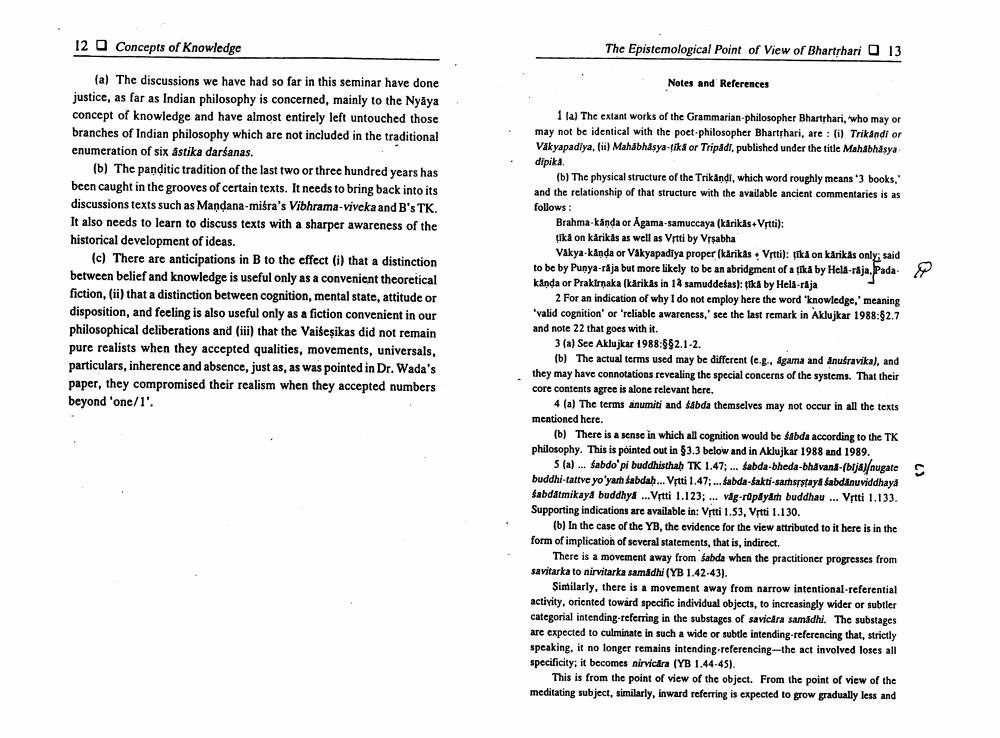Book Title: Epistemological Point Of View Of Bhartrhari Author(s): Ashok Aklujkar Publisher: Ashok Aklujkar View full book textPage 7
________________ 12 Concepts of Knowledge (a) The discussions we have had so far in this seminar have done justice, as far as Indian philosophy is concerned, mainly to the Nyaya concept of knowledge and have almost entirely left untouched those branches of Indian philosophy which are not included in the traditional enumeration of six astika darśanas. (b) The panditic tradition of the last two or three hundred years has been caught in the grooves of certain texts. It needs to bring back into its discussions texts such as Mandana-miśra's Vibhrama-viveka and B's TK. It also needs to learn to discuss texts with a sharper awareness of the historical development of ideas. (c) There are anticipations in B to the effect (i) that a distinction between belief and knowledge is useful only as a convenient theoretical fiction, (ii) that a distinction between cognition, mental state, attitude or disposition, and feeling is also useful only as a fiction convenient in our philosophical deliberations and (iii) that the Vaiseṣikas did not remain pure realists when they accepted qualities, movements, universals, particulars, inherence and absence, just as, as was pointed in Dr. Wada's paper, they compromised their realism when they accepted numbers beyond 'one/1'. The Epistemological Point of View of Bhartṛhari 13 Notes and References 1 (a) The extant works of the Grammarian-philosopher Bharthari, 'who may or may not be identical with the poet-philosopher Bhartṛhari, are: (i) Trikändi or Vakyapadiya, (ii) Mahābhāṣya-tika or Tripädi, published under the title Mahabhasya dipika. (b) The physical structure of the Trikandi, which word roughly means '3 books," and the relationship of that structure with the available ancient commentaries is as follows: Brahma-kanda or Agama-samuccaya (kärikäs +Vṛtti): țikä on kärikäs as well as Vrtti by Vrsabha Vakya-kanda or Vakyapadiya proper (kärikäs Vṛtti): tīka on kärikäs only; said to be by Punya-raja but more likely to be an abridgment of a tika by Hela-raja. Pada kända or Prakirṇaka (kärikäs in 14 samuddeśas): tika by Helä-raja 2 For an indication of why I do not employ here the word 'knowledge,' meaning 'valid cognition' or 'reliable awareness,' see the last remark in Aklujkar 1988:§2.7 and note 22 that goes with it. 3 (a) See Aklujkar 1988:§§2.1-2. (b) The actual terms used may be different (e.g., agama and anusravika), and they may have connotations revealing the special concerns of the systems. That their core contents agree is alone relevant here. 4 (a) The terms anumiti and sabda themselves may not occur in all the texts mentioned here. (b) There is a sense in which all cognition would be sabda according to the TK philosophy. This is pointed out in §3.3 below and in Aklujkar 1988 and 1989. 5(a)... sabdo'pi buddhisthaḥ TK 1.47; ... Sabda-bheda-bhavana-(bija)/nugate buddhi-tattve yo'yarh sabdaḥ... Vitti 1.47; ... sabda-sakti-sarhsrstaya sabdanuviddhaya sabdatmikaya buddhya...Vṛtti 1.123;... väg-rüpāyām buddhau ... Vṛtti 1.133. Supporting indications are available in: Vitti 1.53, Vṛtti 1.130. (b) In the case of the YB, the evidence for the view attributed to it here is in the form of implication of several statements, that is, indirect. There is a movement away from sabda when the practitioner progresses from savitarka to nirvitarka samadhi (YB 1.42-43). Similarly, there is a movement away from narrow intentional-referential activity, oriented toward specific individual objects, to increasingly wider or subtler categorial intending-referring in the substages of savicara samadhi. The substages are expected to culminate in such a wide or subtle intending-referencing that, strictly speaking, it no longer remains intending-referencing-the act involved loses all specificity; it becomes nirvicara (YB 1.44-45). This is from the point of view of the object. From the point of view of the meditating subject, similarly, inward referring is expected to grow gradually less andPage Navigation
1 ... 5 6 7 8 9 10
